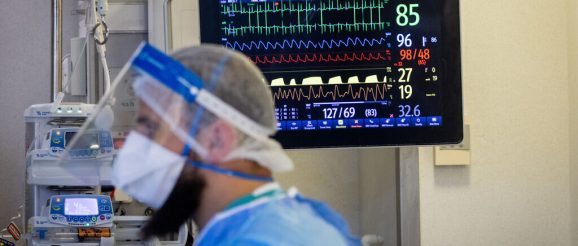Israel earmarks $17m for new digital health innovation program | The Times of Israel

Israel has earmarked roughly NIS 55 million ($17.6 million) for a new innovation program that will allow health organizations such as HMOs, hospitals, and institutes to build the digital infrastructure required for anonymized data-sharing and research and development collaborations with healthcare startups.
Health organizations will use the funds to establish or expand dedicated units that will promote close cooperation projects with the health tech industry and allow companies and research centers to tap into a trove of medical data for insights, analysis, validation, and trials.
Such collaborations will require health organizations to have the appropriate capacity and infrastructure to promote data-based R&D and will improve the ability of startups to conduct research into different diseases and conditions to accelerate developments of treatments and products, explained Aviv Zeevi, VP of Technological Infrastructure Division at the Israel Innovation Authority.
“The purpose is to create an international standard for sharing medical data like SEER [a US program that provides information on cancer statistics], building APIs [application programming interface, software that allows for connection between devices and programs] that will allow health organizations to work with the data. This will also companies to get data from different HMOs and others, based on the same structure,” Zeevi told The Times of Israel on Wednesday.
Zeevi said that the project is estimated to take about two to three years, depending on the health organization. “In some cases, they will be building on existing infrastructure, especially the big organizations like the Sheba Medical Center, Maccabi Health Services, Clalit, and others.”
Israel’s four HMOs — Maccabi, Clalit, Meuhedet, and Leumit — have spent two decades building databases of digitized medical records, comprising the files of more than 98 percent of the population. Touting this “huge asset,” the Israeli government in 2018 approved a NIS 1 billion National Digital Health plan to create a digital database of these medical files and make them available to researchers and enterprises.
Indeed, some of the funding for the new program will source from the National Digital Health Plan, currently under the purview of the Economy Ministry, as well as from the Health Ministry and the Israel Innovation Authority.
The new program, through which the organizations will receive funding of up to NIS 8 million ($2.5 million) each, builds on a previous initiative to support R&D and pilots in the field of digital health.
But the current plan hopes to create more competition, Zeevi said. “Startups will be able to get a competitive proposal for these kinds of [medical data-sharing] collaborations so if they are not able to get to an agreement with a specific hospital, they can go to another one.”
“We know that some projects like these have already started, but it is too slow and there are not enough resources within the HMOs to give the required attention to such initiatives. More startups need this data, but that’s not enough either — they need to work with the data and sometimes they need to speak with the doctors and the nurses; they may need to conduct extra trials. And since, at the moment, this [infrastructure] is not built in the right way, they do need additional support,” he explained.
Health organizations may eventually build an economically viable, independent commercial service for the private healthcare industry, “whether through royalties or other sources of income from the different collaborations,” as well as gain valuable insights into the medical data itself.
Each organization looking to receive the funding will have to submit a detailed plan for how it expects to move forward, what specific data it plans to share, access methodologies, KPIs (key performance indicators) of how many estimated companies it will be able to serve, and pricing models, Zeevi said.
The general overall idea is to build better healthcare, create solutions for health systems, and improve public health, he explained.
Health Minister Nitzan Horowitz said in a statement that Israeli health organizations have “demonstrated impressive capabilities to embrace and implement innovation at a fast pace and adapt to a new world.”
“We want to further strengthen and nurture this capability. Israel can definitely lead in the implementation of innovation in the health system. However, this requires investment in research infrastructure and dedicated manpower. Israeli health organizations are a source of strength to the Israeli economy, and this is clear today to the Israeli government as well,” added Horowitz.
Economy and Industry Minister Orna Barbivai said the new program “will serve as a growth engine, incorporated by the national digital system in the Ministry of Economy and Industry. It is designed to create digital infrastructure designed to help the growth of startups in this field, to promote Israel to the forefront of customized medicine research and to implement advanced digital tools in the Israeli health system, for the benefit of the general Israeli population.”
Israel boasts over 1,500 companies in the life sciences sector, which is generally divided into four major subsectors – digital health, medical devices, biotechnology and pharmaceutical therapeutics.
Funding for this sector jumped by 55% in 2020, compared to the previous year, with health tech firms raising a record $2.5 billion last year, according to a report by the Israel Advanced Technology Industries (IATI), an umbrella organization of high-tech firms operating in Israel.
In the first quarter of 2021, Israeli life sciences companies raised $900 million, the best first quarter in a decade and second only to the fourth quarter of 2020, the data showed.
